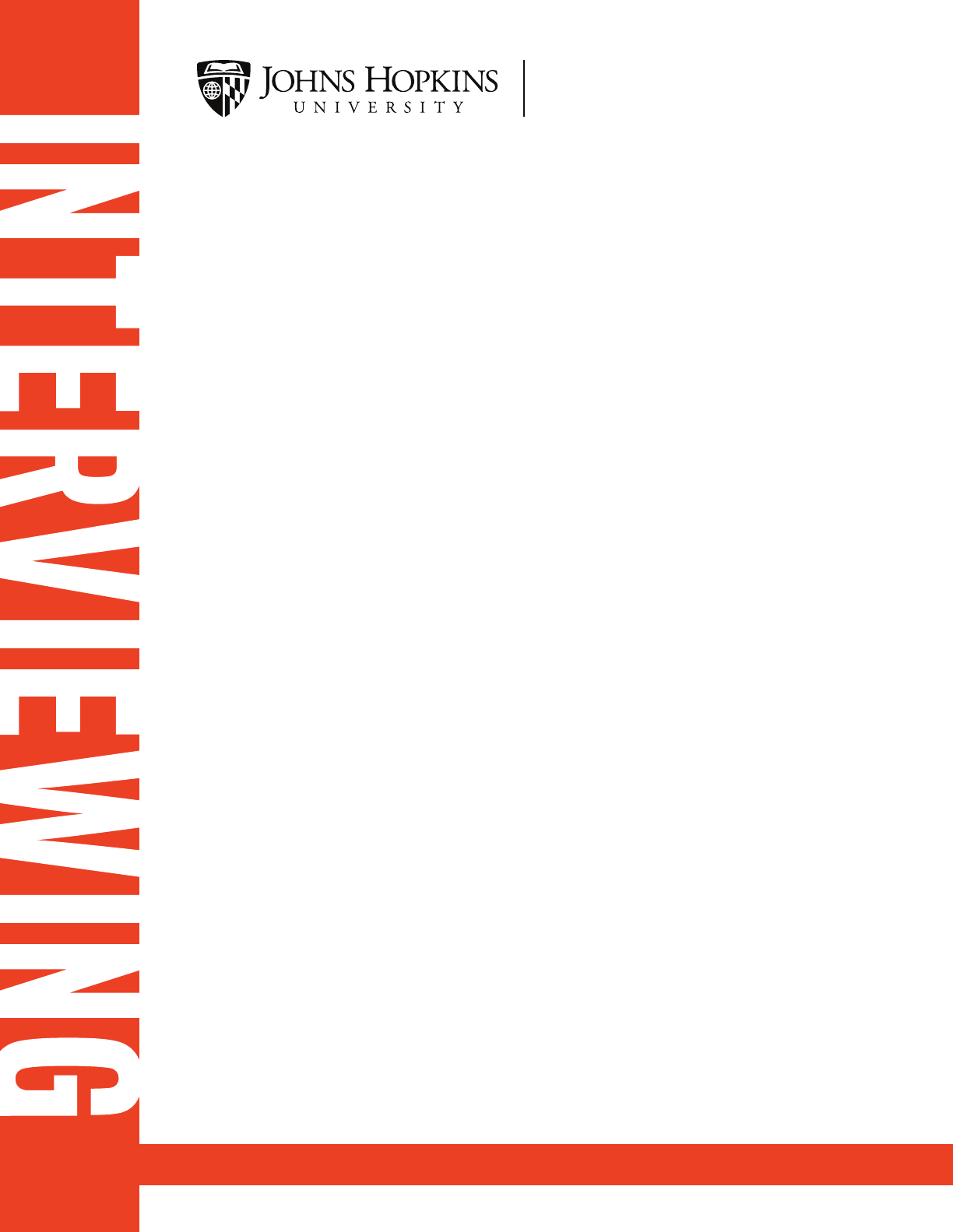
Homewood Student Aairs
Career Center
Interviewing for a job, internship, fellowship, or any professional opportunity can be stressful. The best
way to relieve stress is to be as prepared as possible. This means taking the time to research the nuts
and bolts of an organization, its vision and mission, and learning about the culture. Begin preparing for
interviews shortly aer submitting application materials. That way you have plenty of time to practice
and improve before scheduled interviews. Preparation is critical for your performance during the
interview and for you to feel comfortable with the opportunity. Remember that the interview process is
as much for you as it is for the organization.
BEFORE THE INTERVIEW:
Know Yourself
Make sure you know why you are interested in this position and this employer. How does this position
fit into your career goals, and your personal values? What concerns do you have about the position,
the company, etc.? Employers want to hire people who know who they are and why they want the
position.
Dress Professionally
Appearing professional is extremely important for interviews. Always dress more professionally than
the company culture. If you aren’t sure what to where, always default professional attire. Below are
suggestions for what to wear and what not to wear:
● Dark, solid colored suit (black, navy, charcoal) with ties with subtle patterns; knee-length
skirt or pants suit
● Comfortable, professional, and polished black or brown shoes
● This is the time to shower, shave, and deodorant; brush your teeth; and all hair must be
neatly groomed
● Avoid cologne/perfume and clunky, loud jewelry
● Do not wear jeans, flip-flops, sneakers, miniskirts, exercise wear, T-shirts, or anything you
would wear to bed, the beach, or the gym
Research the Company, the Position, and the Type of Interview
It is essential that you take some time to research the employer and the position long before your
interview. You want to make sure you are familiar with the field, the employer, and the expectations of
the position to be prepared for their questions and to identify questions you have. You can download
an industry guide from Vault.com (access through Handshake) and review the company’s website.
Some of the suggested items to study and ways to get information include:
● Current press releases
● Mission and vision statement
● Strategic plans
● Clients, products, and main competitors
● Aspects of the organization that interest
you
● Follow their social media to stay current
on the most important items to that
company
● Contact JHU alumni, who may be
working with the organization
● Ask them what kind of interview to
expect
studentaffairs.jhu.edu/careers | 410-516-8056 | homew[email protected] | Garland Hall 389

Homewood Student Aairs
Career Center
Type of Interview
There are several types of interview formats, which is why it is important to know what to expect
before you arrive.
● Individual Interview – Candidate meets one-on-one with members of the company
● Panel Interview – Candidate meets with several members of the company at once
● Presentation – Candidate gives a short presentation on a topic chosen by the company
● Group Interview – Several candidates are expected to work together to solve a problem
● Case Interview – Style of interview used mostly by consulting firms that is problem-oriented
● Technical Interview – Candidate asked to solve problems related to specific technical
knowledge
WHAT TO EXPECT DURING THE INTERVIEW
What to Bring
Bring a few copies of your resume and a list of references. Put them in a portfolio or folder and carry
them in a professional bag (not a backpack). Bring your portfolio of work, if your field requires it (e.g.,
art, design, fashion, etc.). Bring a list of questions you want to ask, a nice note pad, and pen.
Sample Questions to Ask Them
● How did you come to work for Company X? What keeps you here?
● Is there any job training for this position? If yes, what kind and who does the training?
● Can you give me an idea of what a typical day in this position looks like?
● What opportunities for professional development exist?
● Is there a formal mentoring program for new employees or recent graduates here?
● What is the hiring timeline aer this interview? Can you tell me when I might expect to hear
from you again?
The Beginning of the Interview
● Arrive 10-15 minutes early to your interview (know your route well in advance and allot extra
time for traffic and finding the location
● Be aware that the interview begins when you enter the building. Therefore, be polite and
professional to everyone you meet including security guards and receptionists; their input
matters
● Greet everyone with a smile. Look them in the eye and smile as you give them a firm
handshake.
Types of Questions You May Be Asked
Practice is the best way to prepare for all the questions you will be asked. In almost all cases, your
answers should be no longer than 1 or 1.5 minutes long. Examples of each type of question below are
on the last page.
studentaffairs.jhu.edu/careers | 410-516-8056 | homew[email protected] | Garland Hall 389

Homewood Student Aairs
Career Center
studentaffairs.jhu.edu/careers | 410-516-8056 | homew[email protected] | Garland Hall 389
Open-Ended or Personal Questions: This is the most common type of interview question that are
asked to learn more about you as a person and a candidate. Have a clear point or theme that you focus
on throughout your interview, emphasize your strengths as a candidate. If you can, refer your answers
back to the job description, your resume, or the research you did prior to the interview.
Behavioral Based Questions: This is a special kind of interview question that asks about your past
behavior to predict your future performance. Employers ask these questions to gauge your strengths
as a candidate. Using the STAR technique to tell a good story is the best way to answer these
questions.
STAR Technique
S = Situation/Skill: briefly describe the situation
T = Task: identify the key objective and issue you have addressed
A = Action: describe the specific actions that you took to address the situation
R = Results (most important part): outcomes or results of your actions
Behavioral Based Questions oen begin with phrases such as:
Tell me about a time…
Describe a situation in which…
Give me an example of…
Prepare for these questions by telling STAR stories based on 5 to 10 experiences on your resume. Do
not use the same example for more than one question.
For information on other types of questions or interview formats (e.g., case, technical) visit the
Resources section of Handshake, contact your Career Coach, or stop by the Career Center’s drop-in
hours.
AFTER THE INTERVIEW
Reflection
Take time aer the interview to review your notes and take stock of your impressions of the position,
the company, potential supervisors, and colleagues. Write down any concerns you have about the
opportunity and any follow up questions you need to ask.
Thank you notes
This is a critical part of the interview process because it shows that you are a professional who
appreciates the time others devoted to the position. Send thank you notes to everyone you met during
the aer the interview. (REMEMBER: get business cards of those you meet.) Emails are appropriate
as long as they are tailored to each person or group of people you meet. You can send a handwritten
note or business format letter to emphasize your interest and appreciation, and if you believe it
appropriate for the situation.
Follow up
The last thing you should know before you leave the interview is when you can expect to hear from
them about the position. If you have not heard by the time they said you would, then call them to ask
about the status of the position and if they need more information from you.

Homewood Student Aairs
Career Center
Open-ended Questions
● Tell me about yourself.
● Where do you see yourself in 3-5 years?
● What are your strengths and weaknesses?
● How did you choose (JHU, your major, your internship, etc.)?
● Discuss your (research, internship, background, technical training, etc.).
● How does this position fit with your long term career goals?
● How do you keep up with your (company, industry, profession, etc.)?
● How do you like to be supervised?
● Why should I hire you?
● What do you know about our organization, why did you apply for this position?
● What questions do you have?
Behavioral Questions
● Tell me about a time you had a personality conflict or a disagreement with a supervisor.
How did you resolve it?
● Give me an example of a time in the last year when you had to be relatively quick in coming
to a decision.
● Describe a situation in which you were the leader. How did you promote the effectiveness of
your team? What were the results?
● Tell me about a time when you were working on a team project and one or more of the
members were not doing their share of the work.
● Describe a time when you had to communicate complex technical information to an
audience with minimal subject knowledge.
● Give me an example of a time when you demonstrated initiative.
● Tell me about the most difficult or frustrating individual you have ever worked with, and
how you managed to deal with that person.
● Tell me about a situation when you experienced failure.
● Tell me about a time when you were very busy and had to set priorities for yourself.
● Please discuss an important written document you were required to complete.
● Give me a specific example of a time when you used good judgment and logic in solving a
problem.
● Tell me about a time when you delegated a project effectively.
Riddles or “Back of the Envelop” Questions
● If you had 6 months with no obligations or financial restraints, what would you do with the
time?
● How many blades of grass are there on a football field?
● How long would it take to move Mt. Fuji?
studentaffairs.jhu.edu/careers | 410-516-8056 | homew[email protected] | Garland Hall 389
